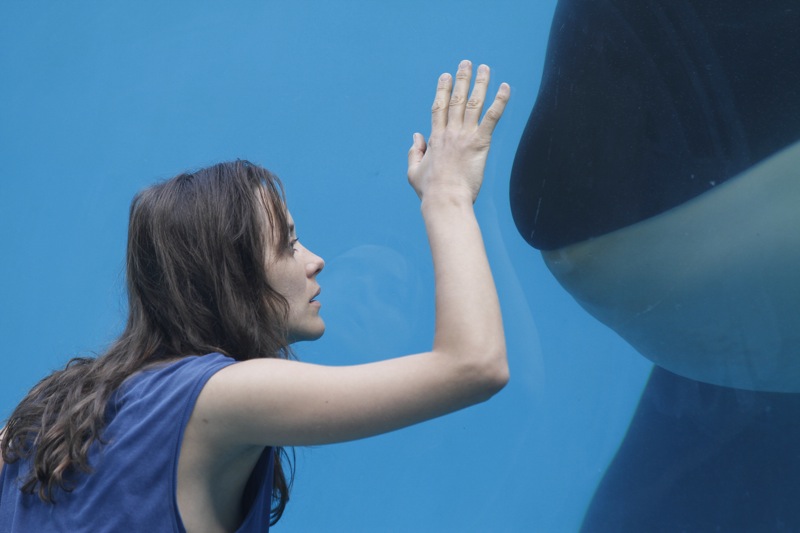Cannes 2012: French master turns up the temperature | reviews, news & interviews
Cannes 2012: French master turns up the temperature
Cannes 2012: French master turns up the temperature
Audiard's Rust and Bone, Anderson's Moonrise Kingdom and a striking tale from the Arab Spring

The first full day of Cannes started with a cracker, appropriately by a Frenchman and one of my favourite contemporary directors, Jacques Audiard. Rust and Bone features a love story between a woman who’s had her legs bitten off by a killer whale and a man who makes his living from illegal street fighting. It ought to be preposterous; Audiard, typically, makes it profound.
It opens with Ali (Matthias Schoenaerts) on the road with his five-year-old son Sam, stealing food from diners, on the way to his sister in the resort town of Antibes. We never learn much of Ali’s back story, or Sam’s mother, other than the fact that she used him to traffic drugs. The father has decided to take the boy’s care into his own hands, and is totally unequipped for the task.
He gets a job as a night club bouncer, where one night he breaks up a brawl where the victim is a woman, Stéphanie (Marion Cotillard). As he drives her home, his commentary on her dress sense is “I’m surprised a whore can train orcas". One wouldn’t expect them to meet again.
Audiard combines melodrama and verité in a way that is natural, gripping and intensely moving
But the next day, while Stéphanie orchestrates her team’s dance routine at Marine Land, the unthinkable happens. Months later, when sympathy suddenly still seems distasteful, the one person she calls is someone who hasn’t an ounce of sentiment. And in his odd, offhand way Ali brings her slowly back to life.
Their romance develops at the same time as his career in the murky world of illegal fighting, and a job as a security man whose job is not to protect the customers but to spy on the staff. It’s a rich mix, of the kind in which Audiard specialises. The Beat That My Heart Skipped was a crime drama whose central character yearned to be a concert pianist; Read My Lips also involved the underworld, but began as an office drama in which a deaf woman falls for an intern. In these, and A Prophet, the Frenchman combines melodrama and verité in a way that is natural, gripping and intensely moving.
 Cotillard (pictured right) is heartbreaking, particularly as Stéphanie starts to emerge from her despair. The scenes where she returns to see one of the whales, and when she sits and replays with her arms her old Marineland routine, will probably be as affecting as any we’ll see in the next 10 days. But there’s wit, too, as when she goes to buy her first car after the accident. “Automatic,” she declares. “But it has to be hot.”
Cotillard (pictured right) is heartbreaking, particularly as Stéphanie starts to emerge from her despair. The scenes where she returns to see one of the whales, and when she sits and replays with her arms her old Marineland routine, will probably be as affecting as any we’ll see in the next 10 days. But there’s wit, too, as when she goes to buy her first car after the accident. “Automatic,” she declares. “But it has to be hot.”
Wes Anderson’s Moonrise Kingdom doesn’t find the director at his best, but this highly eccentric evocation of childhood romance and rebellion was a charming choice to open the festival.
 It’s set on a fictional island, whose adults are melancholy and children restless, particularly two 12-year-olds who decide to elope, he using his scouting skills to good advantage in the wilderness. Bruce Willis plays the local cop on their tail, Bill Murray and Frances McDormand feuding parents, Ed Norton the troop leader who is pointedly asked, “Why can’t you control your scouts?!”
It’s set on a fictional island, whose adults are melancholy and children restless, particularly two 12-year-olds who decide to elope, he using his scouting skills to good advantage in the wilderness. Bruce Willis plays the local cop on their tail, Bill Murray and Frances McDormand feuding parents, Ed Norton the troop leader who is pointedly asked, “Why can’t you control your scouts?!”
As one would expect from Anderson, the production design and soundtrack (featuring Benjamin Britten and Hank Williams) are splendid, here creating a fable that will most resonate with children.
In stark contrast to Anderson’s fantasy was Yousy Nasrallah's After the Battle, a strikingly up-to-date Egyptian drama centred on the consequences of the Arab Spring. Rather than an easy swipe at Mubarak, this is a nuanced (if also occasionally shouty) look at issues of gender and class, as well as politics, concluding that the country’s problems have not been solved by revolution.
The future of Arts Journalism
You can stop theartsdesk.com closing!
We urgently need financing to survive. Our fundraising drive has thus far raised £49,000 but we need to reach £100,000 or we will be forced to close. Please contribute here: https://gofund.me/c3f6033d
And if you can forward this information to anyone who might assist, we’d be grateful.

Subscribe to theartsdesk.com
Thank you for continuing to read our work on theartsdesk.com. For unlimited access to every article in its entirety, including our archive of more than 15,000 pieces, we're asking for £5 per month or £40 per year. We feel it's a very good deal, and hope you do too.
To take a subscription now simply click here.
And if you're looking for that extra gift for a friend or family member, why not treat them to a theartsdesk.com gift subscription?
more Film
 The Woman in Cabin 10 review - Scandi noir meets Agatha Christie on a superyacht
Reason goes overboard on a seagoing mystery thriller
The Woman in Cabin 10 review - Scandi noir meets Agatha Christie on a superyacht
Reason goes overboard on a seagoing mystery thriller
 London Film Festival 2025 - crime, punishment, pop stars and shrinks
Daniel Craig investigates, Jodie Foster speaks French and Colin Farrell has a gambling habit
London Film Festival 2025 - crime, punishment, pop stars and shrinks
Daniel Craig investigates, Jodie Foster speaks French and Colin Farrell has a gambling habit
 I Swear review - taking stock of Tourette's
A sharp and moving tale of cuss-words and tics
I Swear review - taking stock of Tourette's
A sharp and moving tale of cuss-words and tics
 A House of Dynamite review - the final countdown
Kathryn Bigelow's cautionary tale sets the nuclear clock ticking again
A House of Dynamite review - the final countdown
Kathryn Bigelow's cautionary tale sets the nuclear clock ticking again
 theartsdesk Q&A: Idris Elba on playing a US President faced with a missile crisis in 'A House of Dynamite'
The star talks about Presidential decision-making when millions of lives are imperilled
theartsdesk Q&A: Idris Elba on playing a US President faced with a missile crisis in 'A House of Dynamite'
The star talks about Presidential decision-making when millions of lives are imperilled
 Urchin review - superb homeless drama
Frank Dillane gives a star-making turn in Harris Dickinson’s impressive directorial debut
Urchin review - superb homeless drama
Frank Dillane gives a star-making turn in Harris Dickinson’s impressive directorial debut
 Mr Blake at Your Service review - John Malkovich in unlikely role as an English butler
Weird comedy directed by novelist Gilles Legardinier
Mr Blake at Your Service review - John Malkovich in unlikely role as an English butler
Weird comedy directed by novelist Gilles Legardinier
 Don't Let's Go to the Dogs Tonight review - vivid adaptation of a memoir about a Rhodesian childhood
Embeth Davidtz delivers an impressive directing debut and an exceptional child star
Don't Let's Go to the Dogs Tonight review - vivid adaptation of a memoir about a Rhodesian childhood
Embeth Davidtz delivers an impressive directing debut and an exceptional child star
 One Battle After Another review - Paul Thomas Anderson satirises America's culture wars
Leonardo DiCaprio, Teyana Taylor, and Sean Penn star in a rollercoasting political thriller
One Battle After Another review - Paul Thomas Anderson satirises America's culture wars
Leonardo DiCaprio, Teyana Taylor, and Sean Penn star in a rollercoasting political thriller
 Steve review - educator in crisis
Cillian Murphy excels as a troubled headmaster working with delinquent boys
Steve review - educator in crisis
Cillian Murphy excels as a troubled headmaster working with delinquent boys
 Can I get a Witness? review - time to die before you get old
Ann Marie Fleming directs Sandra Oh in dystopian fantasy that fails to ignite
Can I get a Witness? review - time to die before you get old
Ann Marie Fleming directs Sandra Oh in dystopian fantasy that fails to ignite

Add comment